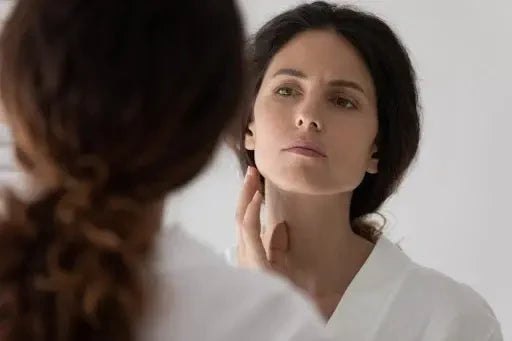What are the first signs that I should stop using a retinol product?
What are the first signs that I should stop using a retinol product?
What are the ‘retinol uglies’?
- Dry skin
- Redness contributing to uneven skin tone
- Discoloration
- Flaking
- Painful skin irritation
What are the ‘retinol uglies’?
- Dry skin
- Redness contributing to uneven skin tone
- Discoloration
- Flaking
- Painful skin irritation
How long do the retinol uglies last?
How long do the retinol uglies last?
Should I stop using retinol in the summer?
Should I stop using retinol in the summer?
What happens if you use a retinol product every day?
What happens if you use a retinol product every day?
What happens when you stop using retinol?
What happens when you stop using retinol?
What are natural alternatives to retinol?
- Rambutan
- Bakuchiol
- Rosehip
- Carrot seed oil
- OS-01 FACE
What are natural alternatives to retinol?
- Rambutan
- Bakuchiol
- Rosehip
- Carrot seed oil
- OS-01 FACE
- Retinol is generally safe, but should be used sparingly. To avoid common negative side effects, consider using lower concentrations of retinol or alternate days in which you use retinol.
- Discontinue use if you have negative side effects after a few weeks of use and contact your physician to help reassess your skin type and find a solution that will protect your skin barrier .
- Consider using moisturizing and soothing topical skin care products with retinol to counteract its negative side effects.
- Always be sure to apply sunscreen when using a retinoid to help protect your ski n against sun exposure .
- There are natural alternatives to retinol that are generally safe for use.
- Retinol is generally safe, but should be used sparingly. To avoid common negative side effects, consider using lower concentrations of retinol or alternate days in which you use retinol.
- Discontinue use if you have negative side effects after a few weeks of use and contact your physician to help reassess your skin type and find a solution that will protect your skin barrier .
- Consider using moisturizing and soothing topical skin care products with retinol to counteract its negative side effects.
- Always be sure to apply sunscreen when using a retinoid to help protect your ski n against sun exposure .
- There are natural alternatives to retinol that are generally safe for use.
- Sharkey, Lauren, Retinol Is a Staple in the Beauty Aisle — But What Is It, Exactly? Healthline. 13 August, 2021. https://www.healthline.com/health/beauty-skin-care/what-is-retinol
- Murray, Dana. 13 Facts to Know Before Adding Retinoids to Your Skin Care Routine. Healthline. 11 February, 2019. https://www.healthline.com/health/beauty-skin-care/retinoid-benefits
- Kaur, Wendy. Does Retinol have a dark side? Icecreamwala Dermatology. https://www.icecreamderm.com/about-us/articles/newsletter/featured-article/does-retinol-have-a-dark-side-/
- Watson, Kathryn. What Is Retinol Burn and How to Prevent It. Healthline. 5 February, 2021. https://www.healthline.com/health/retinol-burn
- Armstead, Morgan. How Often Can You Actually Use Retinol? Healthline. 3 August, 2021. https://www.healthline.com/health/beauty-skin-care/how-often-to-use-retinol
- Based on data from clinical studies and/or lab studies conducted on human skin samples, 3D skin models, and skin cells in the OneSkin lab. Explore more at oneskin.co/claims
- Intner, Katie. The Ultimate Guide to Natural Retinol. Harper's Bazaar. 1 June, 2021. https://www.harpersbazaar.com/beauty/skin-care/a36542105/natural-retinol-alternatives-explained/
- https://www.nature.com/articles/s41514-023-00109-1
- Sharkey, Lauren, Retinol Is a Staple in the Beauty Aisle — But What Is It, Exactly? Healthline. 13 August, 2021. https://www.healthline.com/health/beauty-skin-care/what-is-retinol
- Murray, Dana. 13 Facts to Know Before Adding Retinoids to Your Skin Care Routine. Healthline. 11 February, 2019. https://www.healthline.com/health/beauty-skin-care/retinoid-benefits
- Kaur, Wendy. Does Retinol have a dark side? Icecreamwala Dermatology. https://www.icecreamderm.com/about-us/articles/newsletter/featured-article/does-retinol-have-a-dark-side-/
- Watson, Kathryn. What Is Retinol Burn and How to Prevent It. Healthline. 5 February, 2021. https://www.healthline.com/health/retinol-burn
- Armstead, Morgan. How Often Can You Actually Use Retinol? Healthline. 3 August, 2021. https://www.healthline.com/health/beauty-skin-care/how-often-to-use-retinol
- Based on data from clinical studies and/or lab studies conducted on human skin samples, 3D skin models, and skin cells in the OneSkin lab. Explore more at oneskin.co/claims
- Intner, Katie. The Ultimate Guide to Natural Retinol. Harper's Bazaar. 1 June, 2021. https://www.harpersbazaar.com/beauty/skin-care/a36542105/natural-retinol-alternatives-explained/
- https://www.nature.com/articles/s41514-023-00109-1


